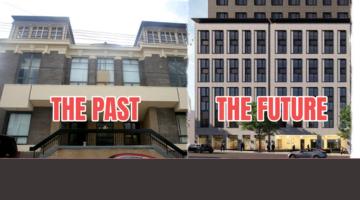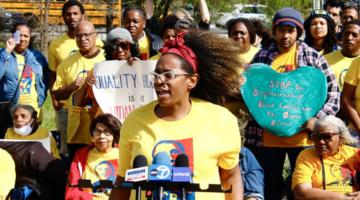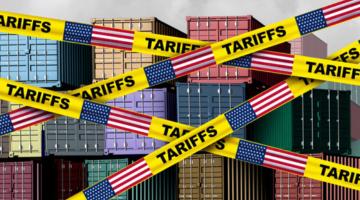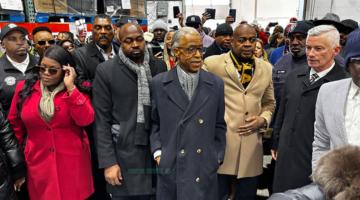The economic stress on African American people shows itself in phenomena like marriage rates. What once was a benefit to Black communities and a path to the middle class, marriage is becoming harder to sustain with low wages and few options for employment.
In retrospect, the tipping point in Desjon Yisrael’s marriage was when his wife announced that she was pregnant with their second child. There was enough love to go around—Yisrael was ecstatic—just not enough money. Unable to finish his college degree, Yisrael cycled in and out of dead-end jobs—working for a printing company, a call center, an eyewear retailer—and took on another one as a store clerk for Dollar Tree when his wife broke the news that they would soon have another mouth to feed.
In a phone interview with Black Agenda Report, the 35-year-old said:
Me and my wife would get into it all the time about me helping with the bills. I took on two jobs to support the family and it still wasn’t enough to pay for everything when the rent was $1300. That can put a lot of stress on a marriage. . . I really think that the economy has a profound effect on Black relationships.
And then:
You have to make six figures to be in love.”
The dissolution of Yisrael’s marriage four years ago is a cautionary tale for Blacks today, not because it is an outlier but because it isn’t. One in three, or 31 percent of African American adults, are married today, which is roughly half the rate 61 percent in 1960. The marriage rate for Blacks is lower than for any other racial or ethnic group, although marriage rates are plummeting across the board. Fifty-six percent of whites are married today, down from 74 percent in 1960, and half of all Latinos are married now, down from 72 percent in 1960.
What’s happening, economists and sociologists say, is that the U.S. is entering the final, wrenching stages of an economic restructuring that began more than 45 years ago. Fed up with sharing their haul with their employees, investors began to pressure the Reagan White House to lower their wage bills by busting workers’ unions and sending their jobs abroad, especially the decent-paying, full-time jobs on the factory floor.
Every president since Reagan has done his part to deindustrialize the economy with labor, banking and trade policies that favor speculation over production, and financiers over factory workers, creating a job market in which there are more fry cooks than millwrights, and more Door Dash drivers than dockworkers.
An economy centered on low-wage, service sector jobs has upset the equilibrium from 50 years ago when employees’ wages accounted for slightly more than half of the national Gross Domestic Product. Workers’ today take home only about 42 percent of GDP, robbing couples of the faith that their grandparents had that they could marry, and raise a family on a single salary.
“American workers are getting the short end of the stick, especially African American and Latino immigrant workers” said Joe Guzzardi, an analyst at the Institute for Sound Public Policy and author of a syndicated financial column told Black Agenda Report. “And these CEOs are not being honest about their struggles to find workers. If you really want to hire workers then the tried-and-true formula is to raise wages, pure and simple.”
And low wages mean that many Black couples have to work multiple jobs to make ends meet, lessening time spent with the family. “And when you do get time together, said Monique Vincent, 34, of Gastonia, North Carolina, “you’re too tired to do anything other than watch TV.”
Gone are the days when African American men in Detroit would advertise their availability and earning potential, by wearing their Ford uniform to church on Sunday mornings.
Said Yisrael:
“For my generation, particularly in (the Black) community, for most men, your main income is not sufficient. . .to sustain yourself, let alone your family.”
This is, of course, a personal tragedy, but impacts economic development in the Black community and may even reduce federal transportation funding for cities with large African American populations. The U.S. Transportation Secretary, Sean Duffy, signed an order on January 29 instructing the agency to “give preference to communities with marriage and birth rates higher than the national average.”
Historically, however, marriage is an institution that, like organized labor and churches, African Americans have used to strengthen their communities.
Indeed, if there were a formula for joining the middle class, the ingredients and sequence would remain fundamentally unchanged from a century ago or from one country to the next, not unlike that for Coca-Cola or the hamburger: graduate from college, marry after your 20th birthday, then bear children. It is the poverty slayer, the anthropological equivalent of a magic bullet.
While racial gaps in both income and wealth remain, married couples accumulate substantially more wealth than do single heads of household. African American children born to unmarried couples are far more likely than those born to married couples to drop out of high school, go to jail, be addicted to drugs or alcohol, or have their own children outside of marriage. In so many words, if you are unlucky in love there is a good chance that you will be unlucky in life.
Compounding the problem for African American couples is a war between the sexes that has been building for more than 30 years. At issue is a widespread interpretation of the African American legal scholar Kimberle W. Crenshaw’s theory of intersectionality, which posits simply that Black women suffer obstacles and discrimination that is singular or unique from both white women and African American men.
But many Blacks contend that intersectionality has been manipulated and deployed as a kind of counterintelligence program to weaken Black solidarity by blaming African American men, rather than racism, for problems in the Black community.
Said Yisrael:
“I really believe the white feminist movement in the 60s and 70s was used to water down the Black struggle. You know Gloria Steinem was a CIA asset,” he said of the white feminist icon who was outed for her work with the intelligence agency in the 1960s, exhorting African Americans to assimilate rather than revolt. “They made feminism out to be the new civil rights movement, but they put Black struggle on the back burner.”
The iconic Black Panther Kathleen Cleaver said in a 2016 interview that white feminists did indeed attempt to influence their movement:
“When our Black Panther movement began in the mid-60s ... the women’s liberation movement in the white community began and they were assuming that our pattern was their pattern ... that they had domination by powerful men and that women have to be liberated in this little context ... we didn’t have that context. What we needed to be liberated from was racism.”
Many African Americans say that the campaign to assign blame to Black men was rekindled in the late 1980s with the release of films such as The Color Purple, the emergence of celebrities such as Oprah Winfrey, and scholars such as the late Bell Hooks, who was an avid supporter of Hilary Clinton in the 2016 Democratic primaries, and was quick to demonize the five Black teens falsely accused of assaulting a white investment banker in New York City’s Central Park in 1991. Commentary from Hooks and others antagonized Black men and sparked a response in the form of the late Kevin Samuels, a podcaster whose polarizing critique of women took aim at both their weight and what he referred to as their fetishization of “high value” African American men.
Vincent told Black Agenda Report that “there are some terrible brothers out there.” But the vast majority of African American men—including the father of her two children—want to do right by their families and simply aren’t provided the resources to do so. She cited a 2007 longitudinal study by a Boston sociologist, Rebekah Levine-Coley, which found that African American fathers who do not live in the same household as their children spend more quality time with them than any other racial group.
“The same people both inside and outside our community telling us how bad Black men are, are the same ones who do not respect Black men on the job at all, said Vincent, who asked to use a pseudonym for fear of antagonizing any of her neighbors in the small community where he lives near Greensboro, North Carolina. “Some of our kings are treated horribly on the job, but they stomach it because they know they have families to provide for.”
She paused and then said:
“I don’t believe Black men are the problem, society is.”
Jon Jeter is a former foreign correspondent for the Washington Post, Jon Jeter is the author of Flat Broke in the Free Market: How Globalization Fleeced Working People and the co-author of A Day Late and a Dollar Short: Dark Days and Bright Nights in Obama's Postracial America. His work can be found on Patreon as well as Black Republic Media.



















